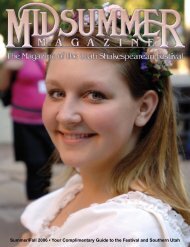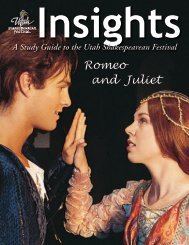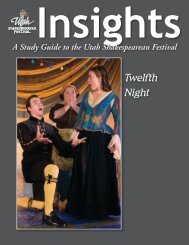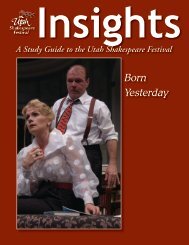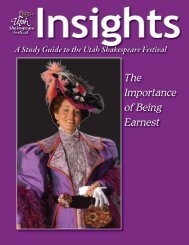The Tempest - Utah Shakespearean Festival
The Tempest - Utah Shakespearean Festival
The Tempest - Utah Shakespearean Festival
Create successful ePaper yourself
Turn your PDF publications into a flip-book with our unique Google optimized e-Paper software.
32<br />
<strong>The</strong> Outer Show and the Inner Truth<br />
By Elaine Pilkington,<br />
From Insights, 2007<br />
One of Shakespeare’s last plays, <strong>The</strong> <strong>Tempest</strong> is a culmination of his life’s work with<br />
familiar situations, common motifs, and echoing themes. Audiences are immediately<br />
comfortable with <strong>The</strong> <strong>Tempest</strong>—the oft repeated relationships of ruler and subject, master<br />
and servant, father and daughter, young lover and worthy lady; its use of the transforming<br />
power of music, magic, and time; and its exploration of the nature of humanity and the<br />
disparity between illusion and reality, between the outer show and inner truth. Despite its<br />
familiarity, <strong>The</strong> <strong>Tempest</strong> is unique unto itself, a new story that also summarizes and perhaps<br />
even transcends the old ones.<br />
Central to the play is Prospero’s island. Like the woods outside of Athens in A<br />
Midsummer Night’s Dream or the Forest of Arden in As You Like It, this uncharted island<br />
is part of the green world, as Northrop Frye called that natural place where characters find<br />
themselves and lose a few of their flaws. However, it is more than just a place removed<br />
from the ordinary traffic of man. “[T]he isle is full of noises, / Sounds, and sweet airs, that<br />
give delight and hurt not” (3.2.135–36; all references to the play are from <strong>The</strong> Riverside<br />
Shakespeare, [Boston: Houghton Mifflin Company, 1974]). Originally peopled only by the<br />
spirit Ariel, the monstrous Caliban, and all manner of supernatural entities, the island<br />
providentially becomes the home of Prospero and Miranda.<br />
As Duke of Milan, Prospero had been absorbed with the pursuit of knowledge, delegating<br />
his brother Antonio to rule for him, but he was oblivious to his brother’s greed for<br />
power and position. With the help of Alonzo, the King of Naples, Antonio seized the<br />
dukedom and banished Prospero and Miranda to an almost certain death cast adrift in a<br />
“rotten carcass of a butt, not rigg’d, / Nor tackle, sail, nor mast” (1.2.146–47). Shipwrecked<br />
on the island, Prospero continues his study, but his focus is broadened in his twelve-year<br />
exile. Separated from Milan, he creates a new kingdom over which to reign. His rule is<br />
benign. He teaches Caliban, attempts to civilize him, and punishes him only because he<br />
must. He cannot allow him to rape Miranda or destroy the order of the island. Ariel and<br />
the other spirits of the island are also his subjects. <strong>The</strong>y are not mistreated and are eventually<br />
freed. Prospero serves his apprenticeship and learns how to rule.<br />
His talents are demonstrated when his brother and the Neapolitans are shipwrecked in<br />
a storm on his island kingdom. With Ariel to do his bidding and other spirits to perform<br />
as commanded, Prospero carefully orchestrates the tempest, the dispersing of the characters,<br />
and what they are allowed to see and do. His art is perfected. Never are they harmed, never<br />
are they in danger. Any discomfort, either physical or emotional, is temporary, occurring<br />
only to lead them to the possibility of a positive transformation.<br />
Prospero’s exile on the island has also taught him to be a father. Here he has learned to<br />
care for another and has integrated human interaction into his character. Miranda remembers<br />
a time when more than four or five ladies waited upon her. On the island Prospero is<br />
exclusively in charge of her upbringing. With his loving guidance, Miranda has become a<br />
consummate princess—in speech, in bearing, in compassion. Prospero tells her that as her<br />
schoolmaster he made her “more profit / Than other princess’ can, that have more time /<br />
For vainer hours, and tutors not so careful” (1.2.172–74). According to Caliban, Prospero<br />
calls Miranda “a nonpareil” (3.2.100). Ferdinand immediately falls in love with her and<br />
says to her, “[Y]ou, / So perfect and so peerless, are created / of every creature’s best!”<br />
(3.1.46–48). As a child, her gentle, compassionate nature prompted her to teach Caliban<br />
<strong>Utah</strong> <strong>Shakespearean</strong> <strong>Festival</strong><br />
351 West Center Street • Cedar City, <strong>Utah</strong> 84720 • 435-586-7880



